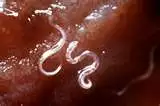Signs of Worms in Dogs
Different worms will show different signs but all types will cause your dog to begin coughing
Signs of worms in dogs can range from mild to severe, depending on the actual worm infestation, but in some cases your dog may show no initial signs at all.
But eventually, any type of a worm infection will start to show you symptoms and the key to helping your dog as quickly as you can is in understanding these signs.
There are some general signs that you can watch for that will show you that something is starting to go wrong.
If your dog starts to lose weight, their coat begins to become very scruffy, or they start to vomit repeatedly, these all may be signs that your dog has a worm infection.
However, the most telling as well as most chilling sign that they have become infected by worms, is coughing.
Coughing by your dog may occur on rare occasions, but the key is rare.
Coughing is simply not normal in your dog, and when they cough it should stop you cold in your tracks as it is that serious and one of the major signs of worms in dogs.
THE SIGNS OF WORMS IN DOGS WILL DEPEND ON THE TYPE
 Coughing is the most chilling of all the signs
Coughing is the most chilling of all the signsThere are arguably six different types of worms and each one will show you a different set of signs. They include Pin Worms, Round Worms, Hook Worms, Tape Worms, and Whip Worms.
But the last, Heart Worms, is by far and away the most serious threat to your dog and they will also show you the most serious signs.
Pin Worms
Pin worms are small white worms that are generally spread to dogs either by contaminated food or water that has been infested.
These parasites will migrate into your dog’s stomach where they then exit out through there anus.
They are very common in dogs and can cause very intense itching, especially around the anus area, but are generally considered quite harmless.
Signs
The most common signs of worms in dogs with pin worms will be when they start to scratch their butt area or drag it across the floor to relieve the itching.
Round Worms
Round worms are almost the exact opposite of pin worms, in that they can be very large, and in some cases can grow up to 10 to 12 centimeters.
They also multiply very rapidly and can be found in extremely high number in your pet.
Adult dogs can become infested with roundworms by infected water or food, or by the vomit or feces from another infected dog.
As disgusting as it sounds, all owners know that dogs will eat almost anything, including vomit and feces in some situations.
Puppies can become infected by contracting this parasite during pregnancy or by drinking the milk from their infected mother.
If one of the puppies becomes infected, the entire litter will become infected in most all cases.
This particular form of worm is extremely sticky and is similar to spaghetti in both substance as well as appearance, and can be transmitted easily between dogs and humans.
 All worms can be dangerous
All worms can be dangerousSigns
The signs of worms in dogs with this parasite will be a very sudden development of colic in puppies, which is a persistent crying.
The next sign is with the nursing mother, as she may not be able to produce milk as long as needed.
Adult dogs will show signs of abdominal swelling, followed by sudden bouts of vomiting.
They will also have very abnormal feces, and these worms will be visible to the naked eye. If this worm migrates into the lungs, your dog will also start to cough.
Tape Worms
Tape worms are perhaps the easiest worm to detect in your dog as they are very long and flat and have numerous segments to them.
You can spot them in your dog’s stool as they will look like rice particles.
They may also stick to your dog’s anus, again appearing like small pieces of rich.
They can be transmitted by fleas, but the most common cause of infestation with this type of worm is by contaminated grain in commercial dog food.
Signs
The signs of worms in dogs with tape worms will also be a very itching butt area, but they can also cause vomiting, diarrhea, and if severe enough, anemia.
They are very similar to pin worms but slightly more severe.
Hook Worms
Hook worms get their name from their major characteristic, hooking or attaching to your dog’s intestine walls and they can be fatal to young dogs.
However, they are in most cases, lethal in puppies.
Infestation with this type of worm is caused by a larval penetration to their skin. Puppies are infected by their mother.
Signs
The signs of worms in dogs with hook worms are the rapid loss of nutrients that they cause, and this will result in a very rapid development of anemia.
The reason is simple; they are literally sucking your dog’s blood from their body.
Your dog will very quickly start to appear unhealthy as a result, and their linings of the nostrils, lips, and ears will turn very pale.
They will also start to show a very dark and tarry stool.
If the hookworm migrates to the lungs, your dog will also start coughing. If they are not immediately treated at this point, it can cause sudden death in your dog.
Whip Worms
Whip worms are long and very thin worms that are transmitted by infested matter, or by another infected dog.
These worms can lay in wait for several months to several years and still be very contagious.
Signs
The first sign that you will see that your dog is affected with this type of worm is severe intestinal stress.
It usually start out with gas, and then will quickly develop into diarrhea. They can also cause severe dehydration very rapidly in your dog.
Heart Worms
Heart worms by all rights, should be in a category by themselves, as they are that serious.
They are transmitted by mosquitoes, and are by far and away the most lethal of all the worms to your dog.
It only takes a couple of these worms to attack your dog, and they very quickly can destroy your pets heart muscles.
What makes them so lethal and sudden, is that in the early stages they show absolutely no symptoms at all.
Signs
The signs of worms in dogs with this demon of worms start with a very sudden development of a hacking cough, and you will know it when you hear it as it will sound like a smokers cough.
This is than rapidly followed by a shortness of breath that will lead to your dog fainting.
By now they have become very weak as they will have a very high blood pressure as congestive heart failure has set in. If these signs do develop, it is the beginning of the end for your dog.
Summary
Signs of worms in dogs can be very mild to extreme in the worst of cases, especially if heart worms are involved.
The good news is that there are several very effective treatments for any type of worms.
It will be absolutely critical that you understand the signs of worm infections, but more critical to use preventive measures and use heart worm medications throughout their entire lifetime.
Sources of Help for Signs of Worms in Dogs
More Worm Conditions in Dogs
The severity of dog heartworm disease that your pet may encounter will depend entirely on the number of adult heartworm that affects them.
Is still the world’s leading cause of anemia where the bodies circulating red cell mass is not sufficient to perform the necessary functions.
Do very little harm to a raccoon, but if dogs or humans come into contact with the infested larva, it rapidly invades several body organs.
Transmission from dogs to humans is much higher than originally believed according to the Center for Disease Control (CDC).
The only licensed drug to treat heart worms, Immiticide, is facing a shortage worldwide.
Whipworms are a type of worm, and as the name implies, resemble a whip in appearance even though they are rarely seen.








